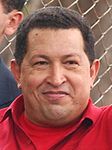Venezuelan presidential election, 1998
|
|
|||||||||||||||||||||||
|---|---|---|---|---|---|---|---|---|---|---|---|---|---|---|---|---|---|---|---|---|---|---|---|
|
|||||||||||||||||||||||
| Turnout | 63.45% | ||||||||||||||||||||||
|
|||||||||||||||||||||||

Presidential election results map. Red denotes states won by Chávez, Yellow denotes those won by Salas Römer.
|
|||||||||||||||||||||||
|
|||||||||||||||||||||||
The Venezuelan presidential election of 1998, was held on 6 December 1998, to elect the new president of the country. The main candidates were Hugo Chávez, a career military officer who led a coup d'état against then-president Carlos Andrés Pérez in 1992; and former Carabobo Governor Henrique Salas Römer. Both candidates represented newly formed parties, a first in a country where the main candidates always represented the parties of the Punto Fijo Pact. Chávez represented MVR, while Salas Römer represented Project Venezuela. Initially weak in the polls, Chávez ran on an anti-corruption and anti-poverty platform, condemning the two major parties that had dominated Venezuelan politics since 1958; and began to gain ground in the polls after the previous front runners faded. Despite the fact that the major parties (COPEI and Democratic Action) endorsed Salas Römer, in the end it was not enough, and Chávez won in a landslide. Chávez was elected to his first term as President of Venezuela with the largest percentage of the popular vote (56.2%) since 1983, when Jaime Lusinchi won with 58.4% of the vote.
Arguably a realigning election, it meant the end of the Puntofijismo that had dominated the political atmosphere of the country in the last 40 years, and the beginning of the dominance of the new MVR party (later renamed PSUV). After Chávez's election, the opposition would never be able to defeat him in a presidential election, and would only win one referendum in the rest of Chavez's lifetime. As of 2016, the PSUV holds 52 seats in the Venezuelan National Assembly, and controls 19 of the 23 governorships.
...
Wikipedia

